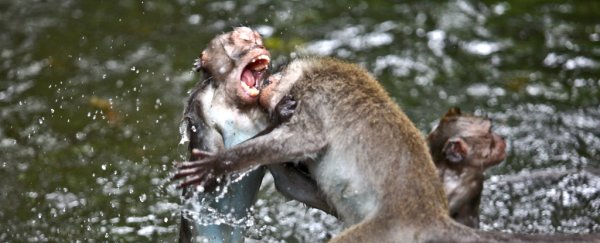A new study has looked back along our evolutionary tree, and shown that humans evolved the tendency to kill each other from our primate ancestors - violence didn't just arise from human nature, as has been suggested in the past.
In fact, at the time of our species' origin, humans were killing each other six times more often than the average mammal today - which, it turns out, isn't anywhere near as bad as some of the species out there.
In the latest study, a team of researchers from the Estación Experimental de Zonas Áridas and University of Granada in Spain, compiled information on more than 4 million deaths across 1,024 mammal species.
They used that data to calculate how many of those deaths were the result of violence from a member of the same species, and then figured out which mammals are the most murderous.
Surprisingly, humans weren't in the top five, despite how dangerous we look on the evening news - and neither were many of the other mammal species we associate with violence, such as lions and wolves.
Nope, the number one most murderous mammal species was actually… meerkats. Yes, cute, adorable meerkats are the mammals most likely to kill another member of their species, with almost one in five meerkats, mostly juveniles, being murdered by another meerkat, according to the new study.
You can see the full top-30 list below:
Here are the 30 mammal species most likely to kill their own kind. #1 might surprise you. https://t.co/qdprrwBjvl pic.twitter.com/vB0e6NjdbZ
— Ed Yong is not here (@edyong209) September 28, 2016
While several studies have looked into the origins of human violence before, this is the first detailed survey to look at violence across the mammal world - and it shows that we're clearly not alone, or even as bad as we think, when it comes to killing each other.
The point of the study was to try to nut out once and for all what makes humans so violent - a question that's been debated for decades.
While many researchers cite examples of brutal wars amongst chimpanzees as evidence that we inherited our violent nature, others claim that human violence only arose due to competition between tribes over resources.
By looking back at the mammalian family tree, lead researcher José María Gómez hoped to get a little bit more perspective about where we fit in the grand scheme of things - and what they found was a combination of both.
"We found that human lethal violence has an evolutionary origin," Gómez told Maarten Rikken over at ResearchGate, "but can be modulated by some ecological and cultural factors, like the type of sociopolitical organisation."
In other words, we definitely evolved the tendency to kill each other, but our culture has affected that violence, too.
To figure that out, the team looked at our evolutionary history - usually, the closer two species are on the evolutionary tree, the more similar levels of inter-species murder they display. Based on that, Gómez predicted how violent humans should be, and then looked at causes of death in 600 humans population between 50,000 BC and today, to figure out how violent we actually are.
What they found was that, humans were around six times more murderous than the average mammal when we originated.
So, when our species first arose, around 2 percent of people (or one in 50) would have been murdered by other humans.
But that rate didn't stay the same - during Palaeolithic times, more than 10,000 years ago, the rate of lethal violence increased to around 3.9 percent.
Then, during the Medieval period, between 400 and 1400 AD, that rate rose to around 12 percent, before dropping over the last few centuries so that we're now far less violent than we were in our prehistoric past - most likely due to being more organised, and having stricter laws in place.
Not all mammals are violent, however. The study showed that around 40 percent of the 1,024 mammal species studied killed each other - and the primates were particularly bloodthirsty.
"While just 0.3 percent of mammal deaths are caused by members of the same species, that rate rose to 2.3 percent in the common ancestor of primates, and dropped slightly to 1.8 percent in the ancestor of great apes," writes Ed Yong for The Atlantic. "That's the lethal legacy that humanity inherited."
But the fact that we've managed to overcome that legacy is what we should be focussing on in these results, Gómez told ResearchGate.
"The main message of the study, from our point of view, is that no matter how violent or pacific we are in the origin, we can modulate the level of interpersonal violence by changing our social environment," he explains. "We can build a more pacific society if we wish."
See guys? There's hope for us yet. Now, let's all just be glad we weren't born meerkats.
The research has been published in Nature.
